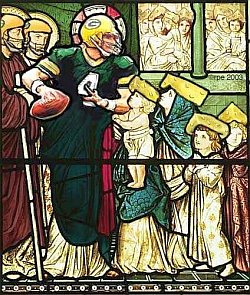This weekend, I listened to a podcast from a well-known Christian organization that featured the banter of two notable hosts. The subject was not banter material, though, because it focused on the alarming rise in the last few years of suicide.
The hosts attempted to pin some of the blame on economic realities. This is no doubt true. One demographic to experience an alarming rise in self-harm: men in their 50s. For most men, the early 50s are imagined as peak earning years. When a job loss or income drop happens at this time, the results can be catastrophic, especially since 50 is the new 70 in the eyes of the corporate world.
When the hosts shifted into talking how the Church should be the answer to people who are looking for hope amid economic misfortune, I wondered if they listened to their own show. Why? Because something telling betrayed their response. It’s the reason why economic realities are not the greater portion of the problem of suicide and its rise.
All throughout the podcast, the hosts mentioned their individual, personal brands. They dropped the names of the top schools their kids attended. They talked titles and honors. In doing so, they broadcast a sub-message greater than the Gospel—at least greater in its ubiquity. It’s the message that powers America and drives people to pull the trigger, cut the wrists, and take the pills. It’s the message of the Organ Grinder’s Monkey.
 I’ve never seen an actual organ grinder and his monkey. Italian men with handlebar mustaches come to mind, wearing Tyrolean costumes, while a capuchin or spider monkey gambols about his feet in a cute, little red vest and fez.
I’ve never seen an actual organ grinder and his monkey. Italian men with handlebar mustaches come to mind, wearing Tyrolean costumes, while a capuchin or spider monkey gambols about his feet in a cute, little red vest and fez.
The one thing about the monkey: It never stops doing its shtick. Fact is, it can’t. Gotta keep dancing so long as the organ music plays.
I visited the website of a well-known church growth leader, and the one thing that impressed me most about his message was how often he begged people to retweet it, buy it in book form, and share his name with friends, neighbors, the neighbor’s dog, the fleas on the dog, and the mites on the fleas.
Because you gotta keep dancing.
Gotta be number one.
Gotta have name recognition.
Gotta be flogging that personal brand. You.
Gotta get those kids into a name school.
Gotta hold down that title, that chair, that fellowship, that thing that will justify your use of air.
Gotta. Because the organ is grinding, the music is playing, and it’s dance or Antonio finds another monkey.
You have to be “on.” All the time.
Do. There is no do not.
If we think we can go to the Church for an answer on this non-stop performance, we can’t. Because so many churches are enmeshed in trying to stay alive that they do everything they can to enhance their brand, their name recognition, their “product.”
Everywhere you turn, it’s perform or die.
Don’t make a mistake.
Don’t relax.
Don’t stop selling.
ABC—Always Be Closing.
The problem is that the Gospel comes along and it’s 180-degrees in opposition to the lifestyle of the organ grinder’s monkey. The Gospel’s freedom comes in not having to dance unendingly. People are no longer slaves to the music the world pipes. God doesn’t give a rip about your personal brand because you’re a mess and will be until you draw your final breath. Your personal brand is just another load of skubalon. So stop with the charade. Grace.
Why do people despair enough to end their lives? I think too many feel that they can’t let their guard down, can’t stop dancing, can’t stop performing, and just can’t shill for even one second more for themselves or for whomever their organ grinder might be. They simply cannot keep up.
When I listen to a Christian podcast and the message sounds like the organ grinder’s music, I don’t wonder why people are not in the seats on Sunday. Because there’s no relief. If the Church can’t tell people they can stop being an organ grinder’s monkey—and give them actual help to cease the tarantella—then no one will. Freedom in Christ will remain high concept and low reality.
We can talk all we want as a Church about grace, but until we stop with the performance mentality, we’ll sit back and watch the suicides pile up and blame them on everyone and everything EXCEPT the real cause.
We took a cruel world and fed into it a bunch of performance lies that make it even crueler. It’s time, Church, to help people throw off their monkeydom and embrace the freedom that comes from being identified by more than our performance.

 For all the handwringing about half-hearted evangelism and declining church attendance…
For all the handwringing about half-hearted evangelism and declining church attendance… Over at Al Mohler’s site, he adds to the talking point that
Over at Al Mohler’s site, he adds to the talking point that